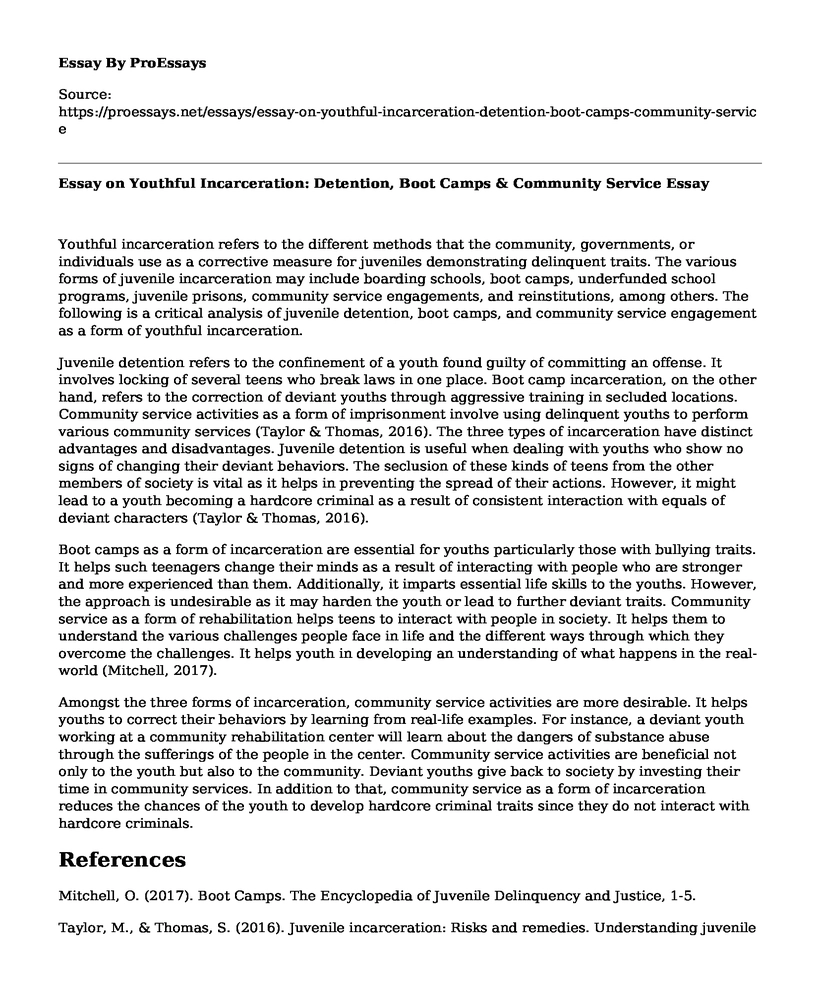Youthful incarceration refers to the different methods that the community, governments, or individuals use as a corrective measure for juveniles demonstrating delinquent traits. The various forms of juvenile incarceration may include boarding schools, boot camps, underfunded school programs, juvenile prisons, community service engagements, and reinstitutions, among others. The following is a critical analysis of juvenile detention, boot camps, and community service engagement as a form of youthful incarceration.
Juvenile detention refers to the confinement of a youth found guilty of committing an offense. It involves locking of several teens who break laws in one place. Boot camp incarceration, on the other hand, refers to the correction of deviant youths through aggressive training in secluded locations. Community service activities as a form of imprisonment involve using delinquent youths to perform various community services (Taylor & Thomas, 2016). The three types of incarceration have distinct advantages and disadvantages. Juvenile detention is useful when dealing with youths who show no signs of changing their deviant behaviors. The seclusion of these kinds of teens from the other members of society is vital as it helps in preventing the spread of their actions. However, it might lead to a youth becoming a hardcore criminal as a result of consistent interaction with equals of deviant characters (Taylor & Thomas, 2016).
Boot camps as a form of incarceration are essential for youths particularly those with bullying traits. It helps such teenagers change their minds as a result of interacting with people who are stronger and more experienced than them. Additionally, it imparts essential life skills to the youths. However, the approach is undesirable as it may harden the youth or lead to further deviant traits. Community service as a form of rehabilitation helps teens to interact with people in society. It helps them to understand the various challenges people face in life and the different ways through which they overcome the challenges. It helps youth in developing an understanding of what happens in the real-world (Mitchell, 2017).
Amongst the three forms of incarceration, community service activities are more desirable. It helps youths to correct their behaviors by learning from real-life examples. For instance, a deviant youth working at a community rehabilitation center will learn about the dangers of substance abuse through the sufferings of the people in the center. Community service activities are beneficial not only to the youth but also to the community. Deviant youths give back to society by investing their time in community services. In addition to that, community service as a form of incarceration reduces the chances of the youth to develop hardcore criminal traits since they do not interact with hardcore criminals.
References
Mitchell, O. (2017). Boot Camps. The Encyclopedia of Juvenile Delinquency and Justice, 1-5.
Taylor, M., & Thomas, S. (2016). Juvenile incarceration: Risks and remedies. Understanding juvenile justice and delinquency, 197-211.
Cite this page
Essay on Youthful Incarceration: Detention, Boot Camps & Community Service. (2023, May 03). Retrieved from https://proessays.net/essays/essay-on-youthful-incarceration-detention-boot-camps-community-service
If you are the original author of this essay and no longer wish to have it published on the ProEssays website, please click below to request its removal:
- Immigration as a Social Issue Academic Paper
- Nonprofit Hospital Dealing With the Affordable Act Care
- Email Scams and Phishing Scams - Research Paper
- Literary Analysis Essay on Chained in Silence
- Essay Sample on Cybercrime: The Melissa Virus & Social Engineering
- Essay Sample on Crime & Punishment: Mens Rea & Acts Rea in the Criminal Code
- 9/11: Global Security Debate in the Aftermath - Essay Sample







